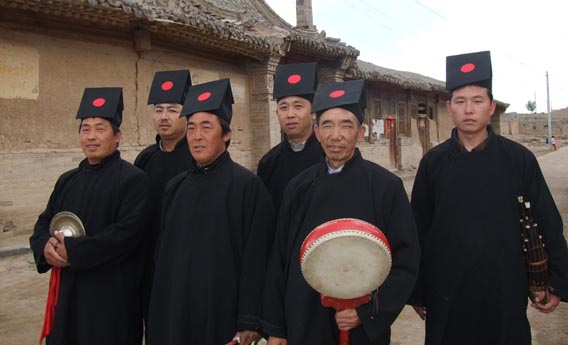Ritual Daosim

Far from both the abstruse mysticism of Daoist philosophy and the celibate priests in the great urban and mountain temples, the main life of Daoism has long been found in small household groups of lay ritual specialists working to bring well-being to their local communities. Don’t ask these Daoists to tell you the meaning of life or to teach you meditation; what people do ask is for them to “do things” (banshi)—to perform rituals for communicating with the gods to grant practical blessings. Ordinary peasants with long hereditary traditions, they hand down complex ritual skills, ritual manuals, god paintings, magic talismans, and mantras within the family, performing long sequences for temple fairs, funerals, and occasional rituals for fulfilling vows, granting healthy sons, and establishing cosmic and social harmony—each lasting two to four days.
The Datong region in the north of Shanxi province, west of Beijing, is one thriving area for these groups (known here as yinyang); the Li family band is most prestigious in the county of Yanggao, with a heritage of some nine generations. The current leader is Li Manshan, son of the late great master Daoist Li Qing (1926–1999). Today’s senior masters were active throughout the early years of Maoism and revived after the Cultural Revolution.
Accompanying processions and rituals before the coffin or the god images are the sounds of the Daoists’ vocal liturgy and percussion ensemble, as well as exquisite incandescent melodic music led by the guanzi oboe and sheng free-reed mouth-organ, another vital part of north Chinese ritual music. Pacing the cosmos, by turns mournful (slow accompanied hymns) and comic (zany tricks with the wind instruments), they maintain their local communities in harmony through the healing forces of ritual and music.
Like all folk culture, this is a patchwork of elements reworked over many generations, and our main inspiration from the Yanggao Daoists is to witness a vibrant ritual heritage still serving folk society today, in a tradition that we can attest conservatively to have been unbroken for several centuries.

